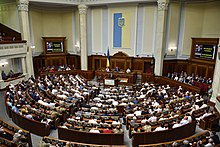Verkhovna Rada of Ukraine Supreme Council of Ukraine Верховна Рада України | |
|---|---|
| 9th Ukrainian Parliament | |
 Logo | |
| Type | |
| Type | |
| History | |
| Founded | 1991[1] |
| Preceded by | Supreme Soviet of the Ukrainian SSR |
| Leadership | |
1st Deputy Chairman | |
2nd Deputy Chairwoman | |
| Structure | |
| Seats | 450 |
 | |
Political groups | Government (235)
Supported by (36)
Opposition (71)
Others (63)
Vacant (46)
|
| Elections | |
| Open list Party-list proportional representation with 5% electoral threshold formerly: Parallel voting: First past the post (225 seats) Party-list proportional representation (225 seats) with 5% electoral threshold | |
Last election | 21 July 2019 |
Next election | Not scheduled (Martial law) |
| Meeting place | |
| Verkhovna Rada building, Kyiv, Ukraine[8] | |
 | |
| Website | |
| rada | |
| Constitution | |
| Constitution of Ukraine: Chapter IV, Articles 75–101 | |
| Footnotes | |
| Due to the Russian military intervention in Ukraine (2014–present) and the annexation of Crimea, only 424 of the parliament's 450 seats were elected in the 2019 election, leaving 26 vacant. The number of vacant seats had grown to 27 as of June 2020.[9][10][11][12] | |
The Verkhovna Rada (/vərˈkɔːvnə ˈrɑːdə/; VR), officially the Verkhovna Rada of Ukraine,[g] the unicameral parliament of Ukraine.
The Verkhovna Rada has over 450 deputies, who are presided over by a speaker. The Verkhovna Rada meets in the Verkhovna Rada building in Ukraine's capital Kyiv. The deputies elected in the 21 July 2019 Ukrainian parliamentary election were inaugurated on 29 August 2019.[13]
The Verkhovna Rada developed out of the systems of the republican representative body known in the Soviet Union as Supreme Soviet (Supreme Council) that was first established on 26 June 1938 as a type of legislature of the Ukrainian SSR after the dissolution of the Congress of Soviets of the Ukrainian SSR.[14]
The 12th convocation of the Supreme Soviet of the Ukrainian SSR (elected in 1990) issued the Declaration of Independence of Ukraine,[14] introduced elements of a market economy and political liberalization, and officially changed the numeration of its sessions,[14] proclaiming itself the first convocation of the "Verkhovna Rada of Ukraine".[14] The current parliament is the ninth convocation. Because of the war in Donbas and the unilateral annexation of Crimea by Russia, elections for the constituencies situated in Donbas and Crimea were not held in the 2014 and 2019 elections; hence the current composition of the Verkhovna Rada consists of 424 deputies.[9][10][11]
In the last elections to the Verkhovna Rada, a mixed voting system was used. 50% of seats were distributed under party lists with a 5% election threshold and 50% through first-past-the-post in single-member constituencies.[15][16] The method of 50/50 mixed elections was used in 2002, 2012, 2014 and 2019 elections; however, in 2006 and 2007, the elections were held under a proportional system only.[17] According to the election law that became valid on 1 January 2020, the next election to the Verkhovna Rada, set to be held after the Russian invasion of Ukraine ends, again will be held under a proportional scheme.[18]
- ^ Законодавство України: Документ 1543-XII: Про правонаступництво України – Набрання чинності від 05.10.1991 [Legislation of Ukraine: Document 1543-XII: On the Legal Succession of Ukraine – Entered into force on 05.10.1991]. Verkhovna Rada of Ukraine (in Ukrainian). Retrieved 1 September 2019.
- ^ "Корнієнко став новим першим віцеспікером Ради. Що про нього відомо" (in Ukrainian). BBC. 19 October 2021.
- ^ "Ще один нардеп перейшов з фракції "Голосу" до групи "Справедливість" – тепер вона в більшості" (in Ukrainian). UNIAN. 7 September 2021. Retrieved 8 November 2021.
- ^ Sauer, Pjotr (20 March 2022). "Ukraine suspends 11 political parties with links to Russia". The Guardian. Retrieved 28 March 2022.
- ^ Shapero, Julia (20 March 2022). "Ukraine to ban 11 political parties with ties to Russia". Axios. Retrieved 28 March 2022.
- ^ "5 people's deputies of OPFL left the faction". Українська правда (in Ukrainian). Retrieved 28 March 2022.
- ^ "People's deputies from the OPFL decided to call themselves PFLP". Українська правда (in Ukrainian). Retrieved 21 April 2022.
- ^ "Official website. Administrative and territorial division". March 2017. Archived from the original on 20 April 2020. Retrieved 9 June 2020.
- ^ a b Parliamentary elections not to be held at nine constituencies in Donetsk region and six constituencies in Luhansk region – CEC, Interfax-Ukraine (25 October 2014)
- ^ a b Ukraine crisis: President calls snap vote amid fighting, BBC News (25 August 2014)
- ^ a b "Ukraine elections: Runners and risks". BBC News. 22 May 2014. Archived from the original on 27 May 2014. Retrieved 29 May 2014.
- ^ "Supreme Council of Ukraine - Ukrainian legislative body". Encyclopedia Britannica. Archived from the original on 21 October 2024. Retrieved 21 October 2024.
- ^ "Their first time. VoxCheck of the first session of the IXth Verkhovna Rada convocation | VoxUkraine". voxukraine.org. Retrieved 1 December 2021.
- ^ a b c d Verkhovna Rada in the Encyclopedia of History of Ukraine
- ^ ВР ухвалила закон про вибори народних депутатів [VR adopted law on the election of MPs to parliament] (in Ukrainian). Interfax Ukraine. 18 November 2011. Archived from the original on 8 January 2016.
- ^ Parliament passes law on parliamentary elections, Kyiv Post (17 November 2011)
- ^ Ukrainian communists to seek return to proportional electoral system Archived 19 April 2013 at archive.today, Interfax-Ukraine (8 November 2012)
- ^ Cite error: The named reference
633561ElectoralCodeVRwas invoked but never defined (see the help page).
Cite error: There are <ref group=lower-alpha> tags or {{efn}} templates on this page, but the references will not show without a {{reflist|group=lower-alpha}} template or {{notelist}} template (see the help page).